Everyone told us NOT to go.
People said it would be impossible for us to drive our own car in. People said we’d get sick. People said… all kinds of stuff really.
The closer our trip date came, the more sick of the banter we became. All of it just made us want to go even more.
Haiti…
What do we know about Haiti really other than the terribly post-earthquake footage shown on CNN…. not much.
We were so close it made no sense not to cross the border and check out the other side of the island.
After spending a full week getting all the paperwork needed to get a car across the Dominican/Haitian border, spending more on gas to get around town than the permits were worth, and burning more calories from sweat in the blistering city traffic per minute than a crossfit workout routine, we were finally ready to go. It’d better be worth it.
We made our way down the south west coast of the DR, spending a week in Bahoruco. Finally we made it to the Pedernales border.
We crossed early morning, knowing the border would probably throw more complications at us, and knowing the Pedernales-to-Jacmel road was probably in pretty bad condition.
The border crossing did cost us more time and run-arounds, but we made it across relatively quickly.
There was some confusion over which permits we needed from the Haitian police, and some more confusion over where to fill up on gas and air for our tires, but by 10:oo am we were on our way down a road.
Asphalt almost immediately gave way to rocks, and we inched along our route, mostly in second gear.
Remote and strikingly gorgeous
The countryside was absolutely stunning.
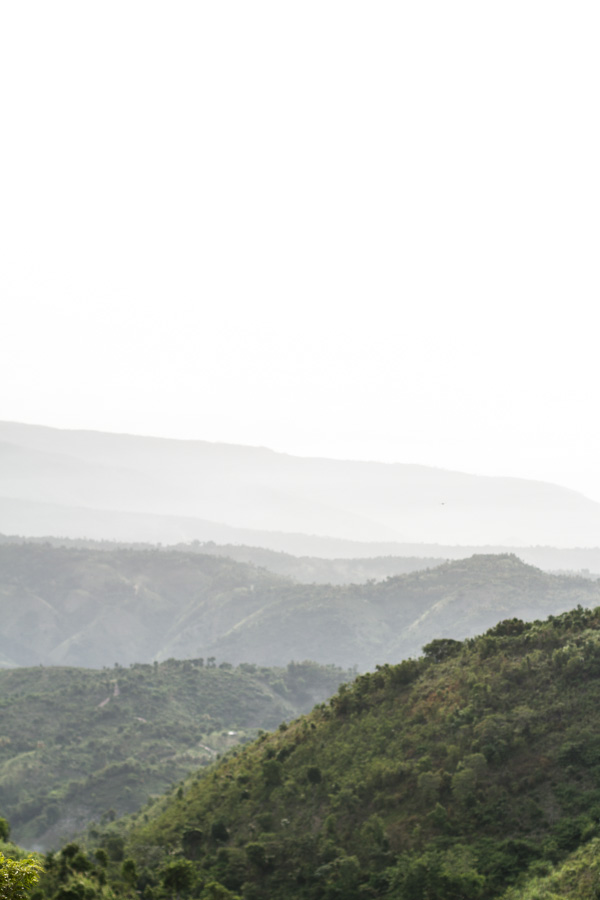
Rolling hill after green rolling hill dropping off into an infinite ocean-scape.
It seemed as if over every hill was a new landscape and we were the only ones there to experience it.
At first the terrain was mostly desert and unwelcoming, but the conditions slowly changed until we were higher up in altitude, in fertile lands, populated by peaceful villages living off grid and off the land.
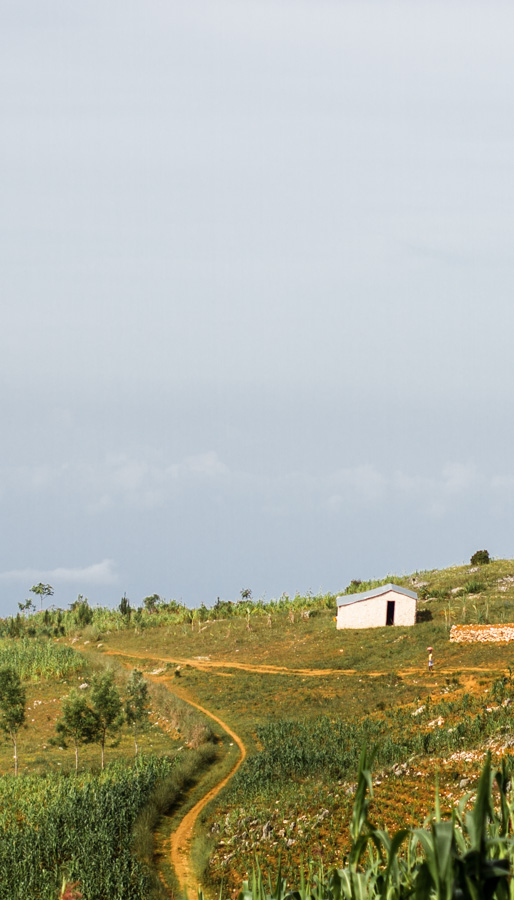
From what we saw, the country side of Haiti seemed not much different than that of the DR. People here carried about their daily tasks and chores, using donkeys to carry anything that was too large to fit on their heads. The complete lack of a paved road was the biggest difference, but even some of the most remote parts of the DR are still accessible only by donkey trails.
If anything, we found the remoteness added a sense of quaintness and authenticity, and definitely helped buffer the trash situation, as anything in packaging would have to come from the nearest town, hours away in all directions.
The major issue seemed to be access to water. We saw groups of women carrying loads of water multiple times along the route.
In hindsight we wished to have spent more time in these parts, but we had no idea how long the journey was going to take, so we continued inching along our rocky road, waving at the people we passed.
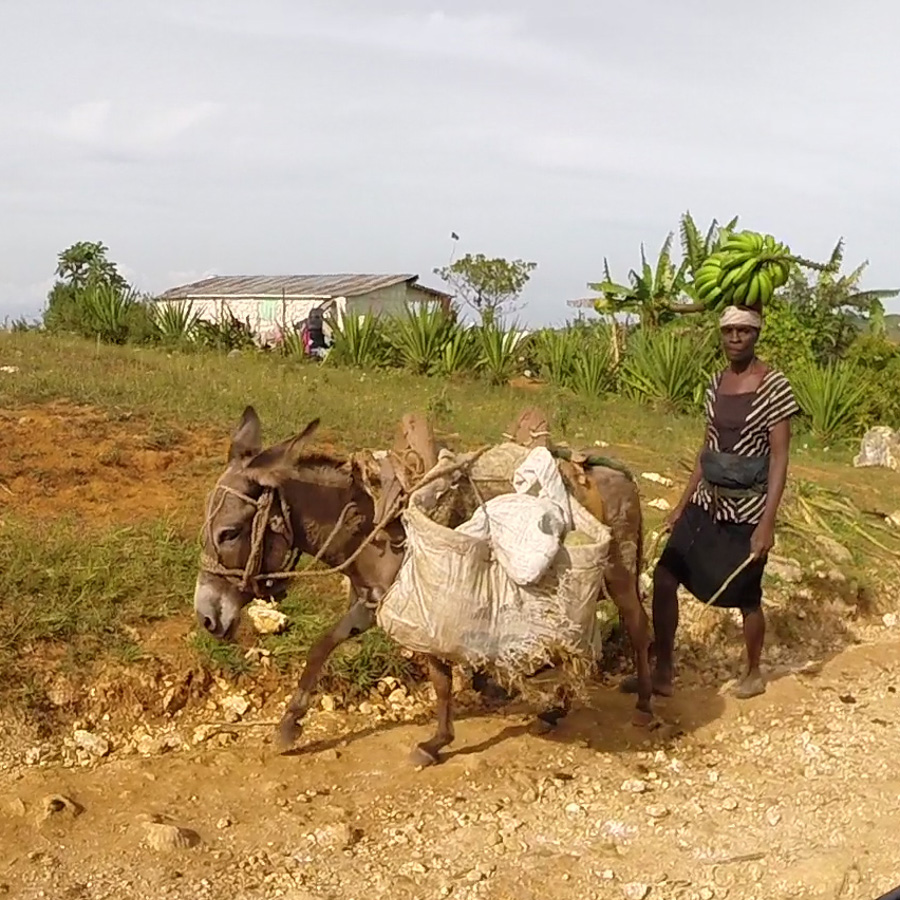
The only other vehicles we crossed were motorcycles or souped up 4x4s with air intakes from foreign NGOs.
We eventually made it to Thiotte a little past lunch time, where we decided to grab some grub off a street vendor.
This lady was cooking up some nice smelling pork and boiled plantains on the side of the road, and we took cover from the mountain storm while she cut us up a serving which we took to go.
Uh Oh.. Was that a good idea?
We each only had one piece. It was yum, but something about the bumpy trip just wasn’t letting it sit well.
So far we didn’t recognize the Haiti we had been told about. This didn’t seem like a country in desperate need of foreign help, or plagued with crime and hunger. This seemed like a quiet, if inaccessible country, where people mind their own business and do what they can to survive day to day in the most simple way they know how. To be honest, it was refreshing.
We ended up driving a ridiculous 9 hours to Belle Anse, a trip that should have taken 2 hours at max if paved. We were pleasantly surprised to find a little beach town here, and hoped a hotel would manifest.
And indeed, right smack in the middle of “town” overlooking the beach was a quaint little hotel that allowed us to rest our heads and escape the clunking and shaking for the night.
Belle Anse
Belle Anse was our first sign of the issues to come. This is where we first saw some unsightly piles of burning trash (remember we’re used to the third world hygiene issues, Haiti is in a whole different ball park)
Also, a quick stroll down to the “pier” got us acquainted with the “ferries” that take people from town to town.
Locals find taking a boat more efficient, and more importantly, more budget friendly than trying to venture on unpaved roads. So the main form of transportation from town to town is via flat passenger boats where people are crammed like sardines, much resembling Dominican Guaguas, except on the open waters. There isn’t much I wouldn’t try in this world, but you couldn’t pay me to get on a small boat, crammed with other people, over shark infested waters, for multiple hours, and often overnight.
No thanks.
We passed.
Overall though Belle Anse seemed quiet enough (save for the street dogs howling all night) and friendly enough. We wouldn’t call it a tourist draw by any stretch, but we rested our eyes in peace and recharged our batteries before heading off again the next day.
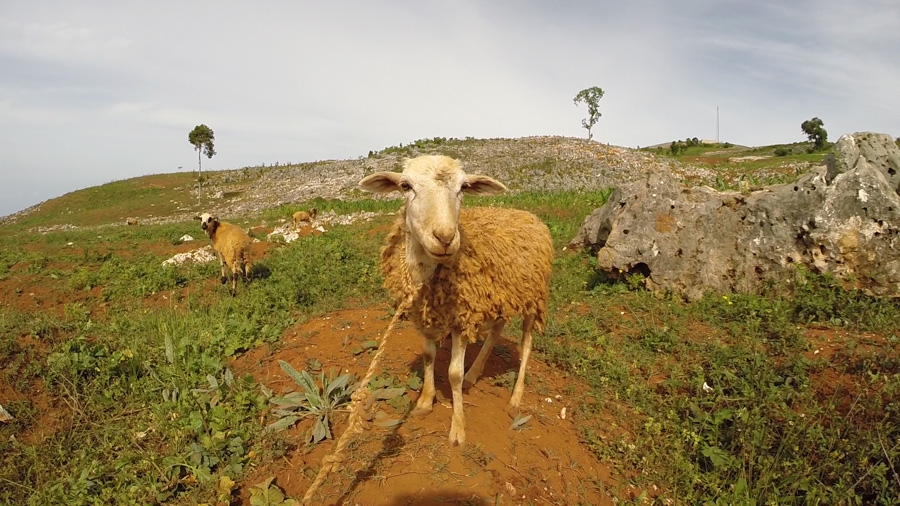
The next stretch of road was more consistently populated than the first, but still not very much, and we again got to enjoy spectacular views and landscapes all to ourselves.
Initiatives seemed to have been taken in many of the more populated areas to make access to water more convenient, and even to bring in crops and cultivation which maybe wasn’t traditional to the area.
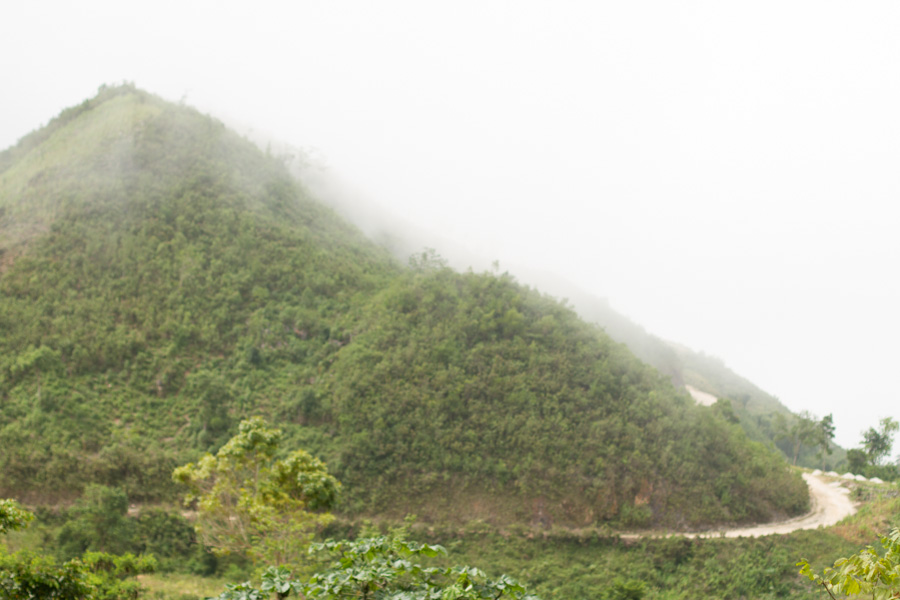
Often we would pass solar street lamps, obviously brought in by foreign aid. Most were still standing, but more and more seemed to have been taken apart and sold for parts the closer we got to Jacmel.
And then it began.
Sure it had been obvious that people throughout Haiti haven’t yet found an alternative to coal, either for cooking, or as a livelihood, and the countryside along the whole coast is definitely scarred by a history of deforestation.
It’s not until one leaves the countryside and approaches “civilization” though that the real effects of the coal industry start showing their more detrimental aspects.
Green quickly leads way to dust.
Whats more, westernization start to rear its ugly head too. Frond-weaved baskets are replaced by plastic. Wood houses are replaced by concrete. Markets line the streets with cheap goods made in Asia. Yes the road is paved, and yet seems much less safe. The population quickly changes from sparse to ridiculously dense. Rivers no longer flow and plastic bottles fill them instead.
The change is subtle at first. We stop for lunch at the restaurant of the Hotel Villa Nicole, which is situated right on the beach in front of a surf break. We’re relieved to be off the rocky road, and even more relieved to have found surf.
Unfortunately, a night here is out of our budget and we head into Jacmel to find something more affordable.
Not for Those on a Tight Budget
We come out empty handed. $50USD seems to be the standard price for a “Blanc” (Literally “white”, what Haitians call Gringos) looking for a room.
At that price we decide being closer to surf is better than being in town, so we head back for the break and find ourselves a $50 room, begrudgingly.
The next morning we awake to find our tire is flat. Whew, lucky that didn’t happen on the road to here because as it turns out the key to our spare is still at home. Oh my!
We take the tire off, load it up in the back of a Tap Tap (the pick ups that serve as public transport) and take it to the closest repair guy, who does a swell job of fixing it pronto, but unfortunately rips us off on the price. That’s alright, live and learn. Although I’ll admit, the currency situation is a bit tough in Haiti.
The official currency is Gourdes, which are about the same as a Dominican Peso, around 40 to the USD depending on that day’s rate. However, most people negotiate in Haitian dollars, which are 5 Gourdes. We have US dollar bills, and Dominican pesos in our pockets… What a headache.
It’s alright. Surf time!!
We get back to the hotel to find perfectly flat conditions, so we take a trip to Bassin Bleu instead, and have a blast (post coming up next week)
Back from a long day, I lay my head down for a nap, and that’s when it happens.
The joint pain.
The exhaustion.
The wasted afternoon in a $50 room that should cost $10.
and then…..
The fever… and all night..
The diarrhea.
Don’t eat the Pork
OH NO! why did I eat the pork?!?!!?
I don’t feel much better the next morning, but I’m unwilling to spend another night here. It’s time to move on.
Before we go Gabriel is resourceful enough to communicate to the chef in creole, which he doesn’t speak, that I’m not feeling well and could use a fresh meal. The chef is nice enough to go out of his way to buy vegetables and boil them for me. He also makes me a tea concoction, the likes of which I’ve never tasted, but which helped a lot. We pay and are on our way, headed for Port au Prince.
The highway is well paved and we’re making headway, through completely deforested hills, and I’m not feeling so hot so we decide to spend the night in a town just outside of Port-au-Prince before tackling the Haitian capital in the late afternoon. (This room runs us about $30 and should be worth $7)
Police Intervention
Cops stop us and we argue with them for a while that we indeed do have all the papers we need to be driving our car in this country. We couldn’t have bribed them even if we wanted to, being completely out of Gourdes and Dollars on a Saturday, past the bank’s closing time. Eventually though, they realize they have nothing and let us go about our way.
The next morning my fever is gone, but the nausea remains. What kind of food poisoning hits 24 hours after the fact and lingers this long anyway?!?!
We head into the Capital.
The Slums
We land (accidentally of course) upon Cite Soleil. If you don’t know of it, don’t feel silly, obviously we didn’t either. It’s just one of the worst shanty slums in the western hemisphere, no big deal.
I cannot begin to explain what the conditions are like here. The road leading from the west of town to the airport just borders it, slums on one side, cordoned off with yellow tape, marshaled by UN officers in full gear, guns loaded, pointed, and ready to “maintain the peace” every 200 feet on the port side, a battalion of white UN tanks lining the city side.
Here, if a child knows what a leaf looks like, it’s from his imagination. The air is thick with dust. There is no shade. There is no water. There are no homes per-se, just makeshift shelters of corrugated metal sheets, black plastic, and reclaimed anything. The unsorted trash burns in piles, just steps away from where makeshift markets sell questionable vegetables and charcoal.
Charcoal.
It infests everything.
ENOUGH.
I can’t do this. I’m going to puke. The nausea from the food poisoning just can’t be held anymore. We’re not far from the border, and if the road isn’t too bad, we can make it back into the DR in just a few hours.
I can’t take the heat. I’m done being ripped off. My sinuses are caked with dust. I’m in no condition to handle the condition of the place we’ve found ourselves in.
Which gives me an incredible respect for those surviving said conditions. Day in and day out. Children are born in this; people fall ill in this; people make do in this; people survive this! Respect.
We got out. It wasn’t our time to be in Haiti.
The border crossing back in was a story in and of itself, but we got through it and spent the night in a reasonably priced room just on the other side of Lago Enriquillo, after having cleansed ourselves in a nearby watering hole.
That night I had an appetite and felt mostly fine.
Gabriel, however, was tired, and slightly warm. His hip hurt, he couldn’t walk so well….
A day later his skin was covered in spots….
Turns out it wasn’t food poisoning after all.
We had contracted Chikunguya. It had nothing to do with that nice lady’s pork!
Our apologies :(
In fact, it meant we’d gotten it while still in the DR, but it had hit us in Haiti. Oh the irony!
Closing Notes on Haiti
I do not pretend to know or understand the complicated state that the world’s first free black republic currently finds itself in, but I do know it lies at the bottom of the global “food chain” or rather “trickle down hierarchy”
I can’t speak for what I don’t know but what I personally found was honest, decent, hard working people, struggling to make ends meet in a country with a destroyed eco system and even worst socio/economic/political system.
I found a people adept at surviving some of the toughest situations humans can survive, doing so with superhuman resilience and dignity.
I found a country in greater need of tree planting and eco-education than armed forces, peaceful or otherwise.
I found a country with a vibrant culture, deeply rooted in its troubled history, all the way through slavery and back to its african origins.
I found an amazingly beautiful country, still virgin and innocent in parts, and devilishly corrupted in others.
I found a country I need to go back to one day, when I don’t have Chikunguya.
I wouldn’t go back as a tourist.
I wouldn’t go back unless I had a purpose.
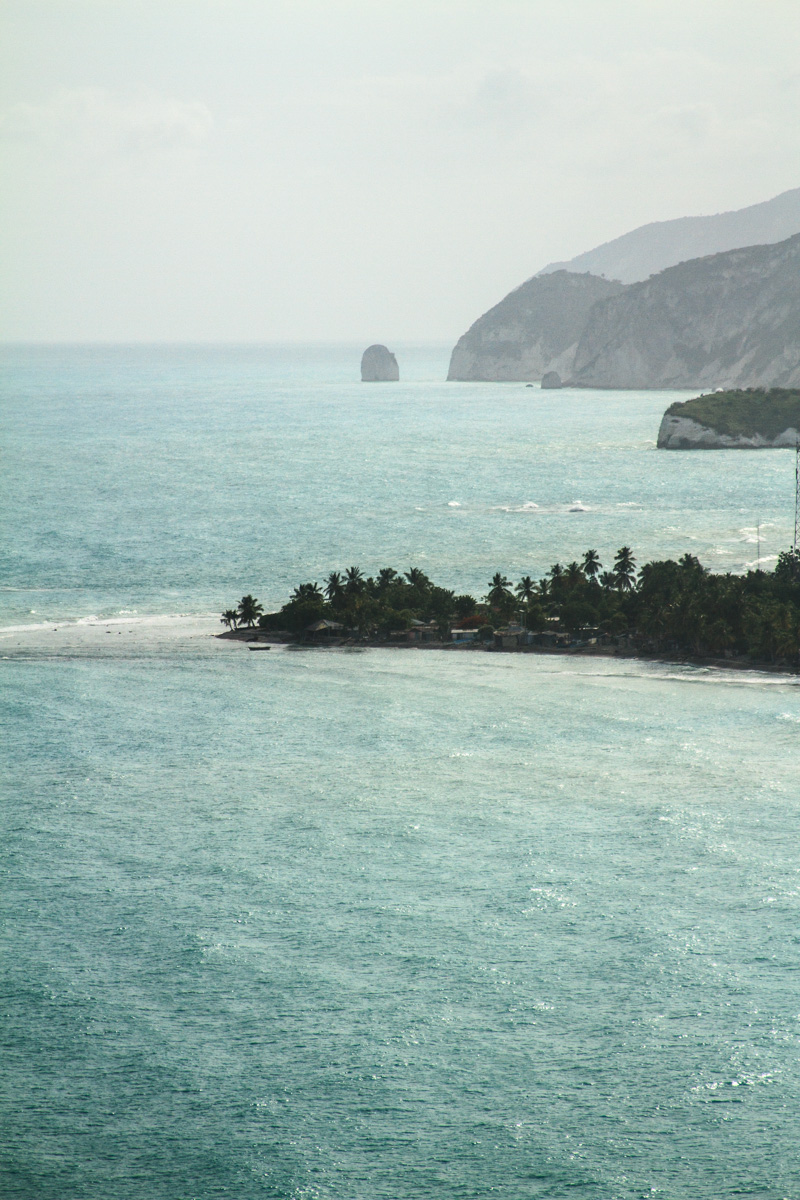
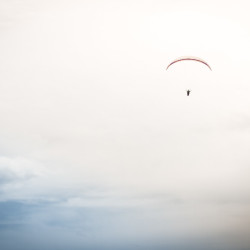

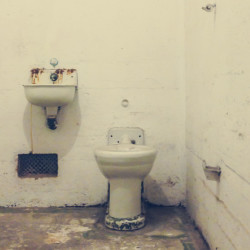
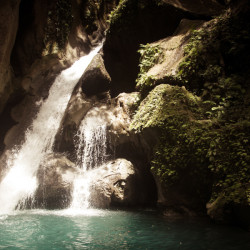
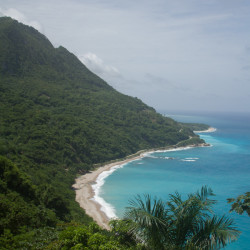
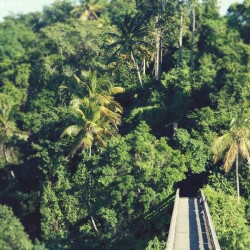
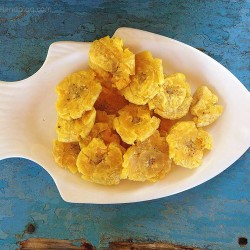
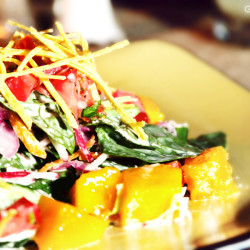
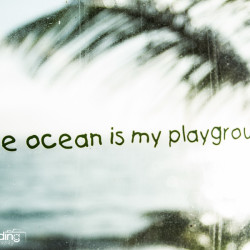
“If a child knows what a leaf looks like, it’s from his imagination” – what a sad, sad social commentary. Thanks for this evocative glimpse into a country quite foreign to me, and yet so intriguing.
Yes Sophie, sometimes travel can be very eye opening.
Thanks for popping by and for the comment.
:)
These are eloquent words to use, unfortunately it is not true. Port-au-Prince does have trees, although it is far from being a forest, just like any other city.
I guess it just depends what part of the city you went to. Where we went there were literally 0 trees.
evocative
glimpse
fabuloso hermoso ..que linda historia gracias por comparttir
alejo
by
vg
Nice post. I used to live in Puerto Plata. Always thought about checking out haiti, now I’m glad I didn’t. Sounds like I didn’t miss much, except maybe the stomach flu.
Visiting Haiti requires some advance preparation ! I’m sorry it did not go well and I do hope you will come back ! If you choose to do so make sure you contact me ! I will give you the contacts you need ! The North is a wonderful place to see ! Have you heard of the Citadelle ? There is so much to see, you will not regret !